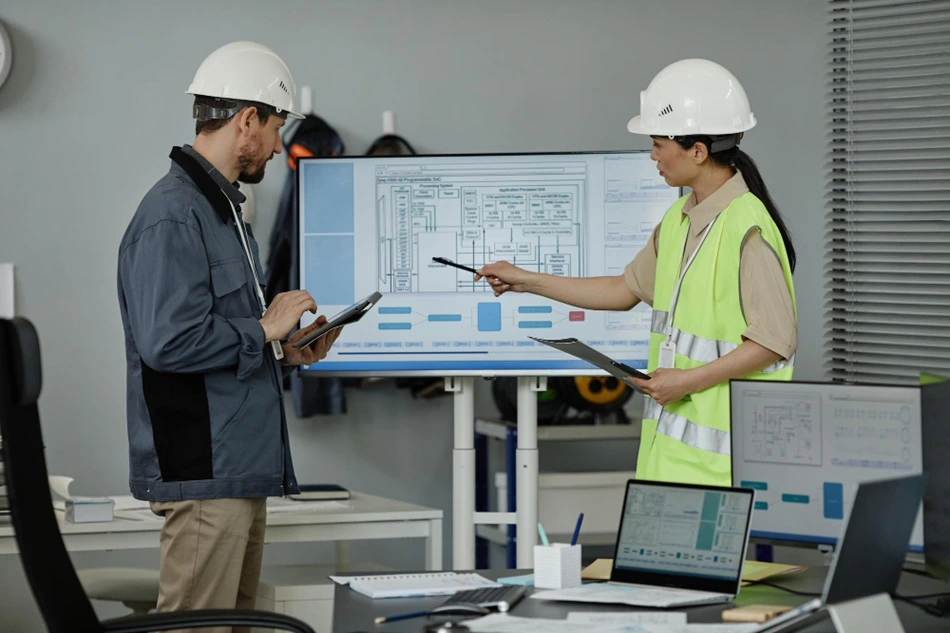Table of Contents
In modern construction, a project is only as good as its services. You can have a beautiful building design, but if the mechanical, electrical, and plumbing (MEP) systems are poorly planned or executed, the entire project suffers. That’s where the MEP Project Manager comes in.
Think of the MEP Project Manager as the conductor of the building services orchestra, coordinating HVAC, electrical, fire protection, plumbing, ELV, and more, while aligning all of it with safety standards, client expectations, and deadlines.
Whether you’re an engineering student thinking about your future career, or a working MEP engineer planning to move into project management, understanding this role is crucial.
Who is an MEP Project Manager?
In simple terms:
An MEP Project Manager is responsible for planning, coordinating, executing and handing over all mechanical, electrical and plumbing works in a project, within time, cost and quality targets.
Job descriptions from leading construction and contracting firms describe MEP project managers (or MEP managers) as people who:
- Oversee design review, coordination, installation and commissioning of all MEP systems
- Manage MEP contractors and subcontractors
- Ensure compliance with local codes, safety standards and client specifications
- Coordinate with architects, structural and civil teams to avoid clashes
- Monitor cost, schedule and quality of MEP works
- Lead testing, commissioning and final handover
In India and the Middle East, MEP engineers and managers are in high demand due to continuous infrastructure growth, airports, metros, hospitals, malls, data centres and smart city projects
MEP Project Manager Duties
- Manage the planning, design, and installation of mechanical, electrical, and plumbing (MEP) systems on construction projects to meet all requirements, specifications, codes, and standards. Work with architects, engineers, and construction teams to integrate MEP systems into the overall project design to ensure compatibility and efficiency.
- Manage project budgets, including estimating costs for materials, labour, and MEP equipment, and controlling costs within budget.
- Plan and supervise MEP system installations to ensure work is completed on time, on budget and to project specifications.
- Liaise with project stakeholders, including clients, contractors, and team members, to ensure a clear understanding of MEP requirements and project timelines.
- Conduct quality inspections of MEP installations to ensure they meet industry standards and comply with all relevant regulations and codes.
- Negotiate contracts with suppliers and subcontractors for MEP materials and services to get the best terms and comply with project specifications and deadlines.
- Research and implement new MEP technologies and sustainable practices to improve project efficiency, reduce environmental impact and provide customers with the latest systems.
Elevate your career with our comprehensive MEP Course! Get Free Demo Here!
Master MEP Design with Industry-Leading Training!
Gain in-depth knowledge of Mechanical, Electrical, and Plumbing (MEP) Design with expert-led courses. Learn HVAC, fire safety, sustainable building strategies, and BIM applications to excel in the construction industry.
Know MoreSalary Outlook for MEP Project Managers in India
When planning your career path toward becoming a full-fledged MEP Project Manager (MEP PM), it is important to have realistic expectations about compensation, so you can make informed decisions on skill-development, certifications and location.
Here are typical salary ranges depending on experience, geography and employer:
- According to one survey, MEP Project Managers in India earn an average salary of around ₹25.8 lakhs per annum, with a range of about ₹17 lakhs to ₹50 lakhs depending on profile and company.
- Another source reports that for “MEP Manager” roles (which may overlap with MEP PM in some organisations), the average is about ₹23.1 lakhs per annum, again with a wide range from around ₹17 lakhs to ₹50 lakhs+ for senior levels.
- A more conservative figure from employment site data shows an average base salary of ₹43,269 per month (~ ₹5.19 lakhs per annum) for MEP Manager roles, this likely reflects junior/mid-level positions or roles in smaller companies.
- At one large multinational (reported for an “MEP Manager” role at AECOM in India), the estimated average salary is about ₹12 lakhs per annum, with the total cost to company possibly around ₹13.2 lakhs.
MEP Project Manager Roles and Responsibilities
1. Project planning and design:
- Collaborate with architects and engineers to develop project plans, including scope, budget, and timeline degree.
- Conduct feasibility studies and site assessments to identify potential risks and limitations.
- Assists in the design and layout of data center facilities, ensuring compliance with industry standards and best practices.
2. Project Implementation and Management:
- Coordinate with internal and external stakeholders to ensure timely completion of project milestones.
- Oversees procurement of materials and services, ensuring compliance with project budgets and specifications.
- Monitor and track project progress, identify and mitigate any issues or risks that may arise.
- Conduct regular site inspections to ensure construction activities comply with project plans and quality standards.
- Cooperate with contractors and suppliers to ensure compliance with safety regulations and quality control measures.
3. Quality Assurance and Documentation:
- Develop and implement quality assurance processes to ensure project specifications are met.
- Conduct regular inspections and audits to verify compliance with industry standards and best practices.
- Prepare and maintain project documents, including progress reports, change requests, and specifications.
- Collaborate with project team to complete post-construction reviews and lessons learned.
3. Team Leadership and Collaboration:
- Provide guidance and technical support to cross-functional project teams.
- Foster a collaborative and inclusive work environment by promoting effective communication and knowledge sharing.
- Mentor and develop junior engineers, promoting their career growth and success.
- Serves as a subject matter expert, providing technical expertise and guidance during project meetings and presentations.
MEP Project Manager Job Requirements
Education: MEP project managers have a bachelor’s degree in mechanical, electrical, or plumbing engineering or a related field like civil engineering or construction management. Their training programs include courses in project management, HVAC systems, electrical system design, plumbing, sustainable building practices, and CAD and project management software. Advanced courses in leadership, finance and risk management are helpful in managing MEP projects in construction operations.
Experience: MEP project managers have a background rich in practical experience in the mechanical, electrical and plumbing industries. Their background includes on-the-job training, industry specific training programs and a deep dive into project management. Successful candidates have experience managing complex projects, leading teams, coordinating across disciplines and bringing projects to completion. Experience in the built environment and knowledge of MEP systems is essential.
Certifications and Licensing: MEP project managers benefit from having a Project Management Professional (PMP) certification. A professional engineering (PE) license is also helpful if you will be supervising technical tasks. Certifications specific to the mechanical, electrical or plumbing disciplines, like Certified HVAC Designer (CHD) or Certified Plumbing Designer (CPD) may also be relevant. But not all positions require these certifications or licenses.
Master MEP Design with Industry-Leading Training!
Gain in-depth knowledge of Mechanical, Electrical, and Plumbing (MEP) Design with expert-led courses. Learn HVAC, fire safety, sustainable building strategies, and BIM applications to excel in the construction industry.
Know MoreMEP Project Manager Skills
HVAC System Design: Design responsibility for installation, maintenance and optimisation of heating, ventilation and air conditioning systems is weak. This is to ensure systems meet sustainability and regulatory compliance targets through technical knowledge of system components, energy saving strategies and integration of innovative solutions for each project.
Electrical load calculation: Calculating a building’s electrical needs is critical to the electrical system operating efficiently and safely. This includes breaking down elements such as lighting, heating & cooling in order to engineer a scheme that matches the project’s energy requirements without causing the electrical infrastructure to be oversized or undersized.
Plumbing Coordination: Coordinating intricate pipe runs with other MEP and structural elements requires a detail-oriented mindset. You have to make the most of space, meet building codes and get an installation in without a hitch, all of which can make or break the project.
Building Information Modelling (BIM): It’s imperative to coordinate and integrate these complex MEP systems within a single model. It fosters cross-disciplinary collaboration, maximizes design efficiency and minimizes construction errors.
Contract Negotiation: Getting terms that work for the project and budget and timelines matters. Knowing technical standards, legal rules and liability costs is needed to defend everyone’s interests.
Quality Control Standards: They demand finesse and proactiveness to fulfill. As well as staying current on best practices for compliance, aligning with stakeholders, and instituting feedback loops during the project.
MEP Project Manager Work Environment
MEP Project Manager (Mechanical, Electrical and Plumbing) is a great role where you divide your time between spending time in the office and on-site running projects. Their offices are often nomadic, roving between an office with sophisticated design and project management software to trenches where they oversee their plans being brought to life. This role requires ragged working days, late nights in the office to complete project sprints, spanning between traditional hours and on-site presence.
The dress code transitions from smart casual office attire to hard hats and safety boots in the field. Working with various professionals– from architects to masons– is a big part, fostering a collaborative environment filled with learning. Health and safety is paramount for us, especially on construction sites where protocols have to be adhered to rigorously. It’s fast, many projects concurrently, so they have to be rather disciplined with their time. Technology is crucial, from design software to project management tools, to ensure that each project is accurate and efficient.
Elevate your career with our comprehensive MEP Course! Get Free Demo Here!
MEP Project Manager: Qualifications and Requirements
- Bachelor’s degree in engineering or related field, preferably in electrical engineering or building services.
- Proven experience in project management, particularly in the context of our large works, new build projects or milestone projects.
- Excellent communication and interpersonal skills, able to collaborate effectively with cross-functional teams.
- Good problem solving and decision making skills.
- Attention to detail and ability to manage multiple projects at once.
- Entri App provides career-oriented training with practical experience. Our team of expert professionals train you to get placed in top notch companies. You have the option of both recorded and live classes with 6 months mentorship.
Conclusion: MEP Project Manager – A High-Reward, High-Stress Role
The role of an MEP Project Manager straddles engineering, management and leadership. Its tough, no question about that – but it’s also one of the most admired and handsomely paid jobs in the building and construction services game.
If you:
- actually get a kick out of juggling teams,
- enjoy having to think on your feet and fix problems as they pop up on site,
- are okay with having to navigate both blueprints and personalities,
- and want to climb the career ladder beyond just a technical post
Then the MEP Project Manager path might just be the right fit for you.
Get started on building your skills from the ground up – through actual projects, keeping on learning and upskilling with a program like the Entri MEP course – that way, over time, you’ll be running the show from the get go not just part of it – from concept to handing over
|
Engineering Upskilling Courses
|
| MEP Course |
| BIM Course |
| Quantity Surveyor Course |
| Structural Design Course |
| MEP QS Course |
Master MEP Design with Industry-Leading Training!
Gain in-depth knowledge of Mechanical, Electrical, and Plumbing (MEP) Design with expert-led courses. Learn HVAC, fire safety, sustainable building strategies, and BIM applications to excel in the construction industry.
Know MoreFrequently Asked Questions
Who is an MEP Project Manager?
An MEP Project Manager oversees mechanical, electrical and plumbing systems in a construction project, ensuring schedules, quality, safety and budgets stay on track.
What are the main responsibilities of an MEP Project Manager?
Planning, coordination, procurement, quality control, safety supervision, commissioning, cost management and client communication.
What skills are required to work as an MEP Project Manager?
Strong technical knowledge, scheduling skills, leadership, communication, cost control, BIM understanding and problem-solving abilities.












